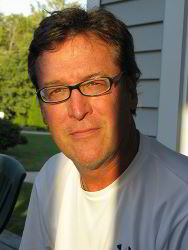|
Phil Labranch Massachusetts DAV from the USMC AS Environmental Science Holyoke Community College '06 Graduate of the UMASS COVERTS program; 2006-2008 elected member of Russell Planning Board; 2005 REU Intern at Harvard Forest (worked with Scott Costa on HWA); Intern with the Huntington Conservation Commission 2003-2004; Member of ENTS since 2003; Chairman for the Citizens for Renewable Energy 2005-2007; 2003 Outstanding Achievement in Science and Technology (HCC); Created the workshops and pamphlets for: Forests-Tree Identification and Succession, Wetlands-Not Just Swamps, Biodiversity-You Can Make A Difference; Forest Dynamics-Independent Research Project (HCC): Fraxinus Americana-What Soil Factors Influence Growth-Independent Research Project (MA DCR, ENTS, & HCC-with assistance from Lee, Bob, and Gary); Worked for Spectrum Analytical (environmental lab) from 2007-2009; Professional photographer, who adores photographing the outdoors & tree forms And…………………………………………wait for it……………………………………………………..Melha Shrine Clown, who will attend NECI next week (North East Clown Institute)!!  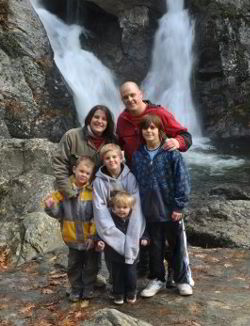 Phil LaBranch and family |
Diana Lee: I have to say that as I tell my friends about this organization, I am amazed by all the suggestions I'm receiving about large trees in my area. I live about 50 miles north of NYC in a fairly rural area of Putnam County. Although I have met with overall enthusiasm for the work of the ENTS, my friend Luanne, summed it up well yesterday when she said that it touches her heart just knowing that there are people out there who are doing this work. She deeply appreciates the efforts as do I and my many outdoor-tree hugging- friends. I envy Bob the ability to spend many hours hiking around the woods measuring trees! Somehow it reminds me of Holden Caufield wanting to be a Catcher in the Rye. What a great reason for hiking around listening to the voice of nature, enjoying the stillness, and recharging the spirit. When I'm not measuring trees, working, taking care of my kids, etc. etc. I am usually in my kayak. I live near The Great Swamp which runs from Dover Plains to Brewster NY about 20 miles of wonderful wetlands. Populated by beaver, otter, weasels, mink, herons, kingfishers, red - tailed hawks, and an occasional fisher, as well as the usual suspects, it is an amazing place! I would be happy to take anyone for an adventure in the Swamp - just send an email! Right now it is still in bloom with Clematis and purple and white swamp plants that I can never seem to remember the names of! I even saw forget-me-nots still blooming a couple of days ago. http://www.nativetreesociety.org/fieldtrips/new_york/ bedford/bedford_ny.htm 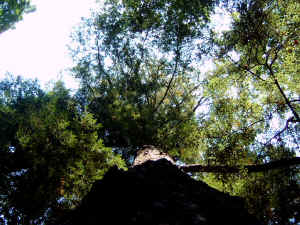 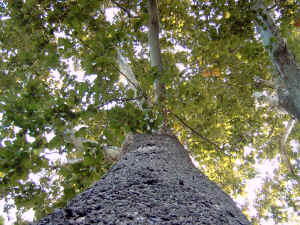  |

Dale Luthringer Dale Luthringer has been the Environmental Education Specialist at Cook Forest State Park for the past 8 years. He facilitates interpretive programs and teacher workshops to over 15,000 participants per year. His ecological research includes acid mine reclamation, white-tailed deer populations, West Nile virus, and most recently the Old Growth Forest. Dale has quite a varied background. He was a farmer for 9 years, a Marine Corp sergeant, and a furniture maker. After his 4 years with the Marines, he moved to the area to attend school. Dale earned an A.S. in Wildlife Technology from Penn State DuBois and a B.S. in Applied Ecology from Clarion University.
http://www.cookforest.com/forestfriends/ Old Growth Forests in the Pennsylvania Wilds by Dale Luthringer http://www.dcnr.state.pa.us/info/pawilds/0809-twotw.aspx Luthringer, Dale J. 2009. Big Trees of Cook Forest. Pennsylvania Forests, Volume 100, No. 3, Fall 2009. |
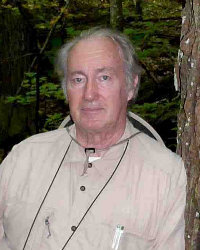 Robert T. Leverett
Friends
of Mohawk Trail State Forest:
Cofounder (1993), President, and principal old growth forest
ecologist
for this federally recognized non-profit environmental
organization and an officially recognized Friends organization
to the state forests and parks of the Commonwealth of
Massachusetts.
Books
‘Stalking the Forest Monarchs-A Guide to Measuring
Champion Trees’
‘Old Growth In The East, A Survey’ Wrote forward and lead essay for Dr. Mary
Davis's publication seminal publication on the old growth sites
in the East, 1993. Provided the data for southern New England
and selected sites in northern New England, New York,
Pennsylvania, and the southern Appalachians. Assisted Mary Davis
with the 1996 update.
‘Re-Wilding the Northeast - A New Wilderness Paradigm’
‘Sierra Club Guide Book to Ancient Forests of the Northeast’
‘American Indian Places – A Historical Guidebook’
Contributor to
this book organized by Frances Kennedy. Houghton Mifflin
Company, 2008 John Daviis, Conservation Director of the Adirondack Council, commented on Bob and his role as an "Evangelist for Old Growth": "It was your contagious and charismatic enthusiasm for big and old trees in part, Bob, but also your commitment and dedication to wild forests, your powers of articulation in describing them, your sleuth-like ability to find them, and your moving sermons on their behalf! In short, with respect to great trees and wild forests, you speak with authority. You've a clear vision of how the East should be broadly and wildly forested, again some distant day." |
 Monica Jakuc Leverett Treasurer of the FMTSF http://www.monicajakucleverett.com/ Born in Newark, New Jersey, Monica Jakuc (Leverett) received her Bachelor's and Master's degrees from The Juilliard School, where she studied with James Friskin and Beveridge Webster. She later worked with Leon Fleisher at the Peabody Conservatory and with Russell Sherman in Boston. Konrad Wolff, renowned pianist, pedagogue and historian, was also one of her mentors. Monica Jakuc (pronounced Ya kutch) is the Elsie Irwin Sweeney Professor of Music at Smith, where she has taught since 1969. Her performance of J. S. Bach's "Goldberg" Variations at Merkin Hall was hailed by New York Times music critic Tim Page as "an auspicious debut...one will observe Miss Jakuc's career with more than usual interest." A champion of contemporary music, Ms. Jakuc opened her 1988 London debut recital with the first performance of a work written especially for her by Ronald Perera. New York audiences first heard her perform in 1980 at Alice Tully Hall in "A Program of Twentieth-Century Music for Two Pianos" with pianist Kenneth Fearn. Other concert highlights include a series of recitals in Japan, many appearances on the East and West Coasts, and a highly successful tour in Alaska. In recent years, she has featured the music of women composers on her programs, which have included appearances at two national conferences: Feminist Theory and Music III in Riverside, California, and “Women in Music: the Last 100 Years” in Athens, Ohio. She has also been a featured artist at International Association of Women in Music concerts in London and Washington. She has given lecture-recitals on women composers at Oberlin Conservatory of Music, and at colleges in the Northeast. Inspired by Malcolm Bilson, Monica Jakuc has also performed on early pianos since 1986. As a frequently invited guest artist in a series of Historical Piano Concerts, she has played instruments from the E.M. Frederick Collection in Ashburnham, Massachusetts. She was both an organizer of, as well as a performing artist in, HaydnFest 1990, an international conference of scholars and performers held at Smith College, and co-sponsored by the Westfield Center for Early Keyboard Studies. She has also appeared as guest soloist with Arcadia Players, and will debut her new 6 1/2 octave McNulty fortepiano in their series this season playing Schubert’s “Winterreise” with Peter W. Shea, tenor. With noted early music violinist Dana Maiben, she recorded Francesca LeBrun’s complete Opus 1 Sonatas for Fortepiano and Violin on Dorian Discovery. She has also played fortepiano sonatas by Marianne von Martinez, Marianna von Auenbrugger, and Joseph Haydn on a Titanic Records CD. Her new recording of “Fantasies for Fortepiano” by Mozart, Haydn, C.P.E. Bach and Beethoven is now available on cdbaby.com.
http://cdbaby.com/cd/monicajakuc http://www.smith.edu/music/faculty_jakuc.php
|
Artist’s Statement Most Americans are accustomed to past romantic photographic images of what was thought to be an undisturbed land. They consider the Ansel Adams’ images of the American West their definition of American grandeur. The images in this collection represent my attempt to draw attention to additional places where grandeur resides-those forest and savanna cathedrals found in almost every state in the East. In effect, I hope to contribute to a re-definition of American grandeur to include species complexity, diversity and subtlety as parts of the standard. To me, grandeur also resides in the simplicity of organic natural forms seen in the forest. These old growth remnant sites are indeed the last echoes of a forest that dominated the eastern landscape and still serve as genetic reservoirs for our forested future. By the time I am finished, I will have photographed from the dry savannas of Arkansas/Texas to upstate New York and from the boreal forests of northern Minnesota to the swamps of South Carolina. Production Notes All prints in this series were made using a combination of traditional and digital photographic techniques. The scene was captured with a traditional camera using black and white negative film. That film was scanned and converted to a digital file, optimized using photographic software and printed using archival carbon pigment inks with an inkjet printer onto Hahnemuhle German Etching paper. Each individual frame in this three-frame assembly has a separate plane of focus. The narrative is enhanced as the viewer is led through the scene as one would if present while the picture was captured – focusing on various places within the scene as one would while standing in the place. 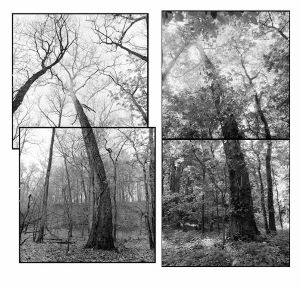
Miles Lowry Old Growth Gallery 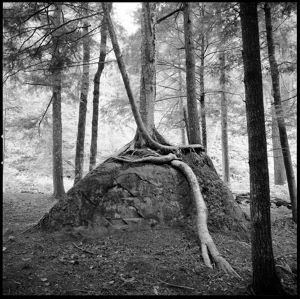 excerpts from an article by Miles Lowry http://www.nativetreesociety.org/ photography/index_photo.htm : "I make no attempt
at trying to show the whole of the Eastern forest giants I find. My
images of both forests and savannas are made of various combinations of
square images captured with my medium format Hasselblad. I use old style
film. After developing it chemically, I scan the negative and improve
the images digitally. Instead of hiding the dark film edges when I
combine the images in Photoshop, I emphasize them.
( |
|
Arborist
Working arborist in the Pioneer Valley. Always with an eye to the
sky! (or the ground as necessary) ;-)
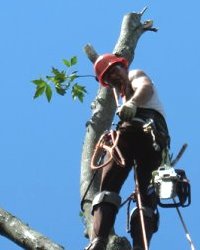
|
 |
|
| xxxxxxxxxxxxxxxxxxxxxxxxxxxxxxxxxxxxxxx | xxxxxxxxxxxxxxxxxxxxxxxxxxxxxxxxxxxxxxxxxxxxxxx | xxxxxxxxxxxxxxxxxxxxxxxxxxxxxxxxxxxxxxxxxxxx |
|
ENTS Organization ENTS People -Alphabetical
|
||


